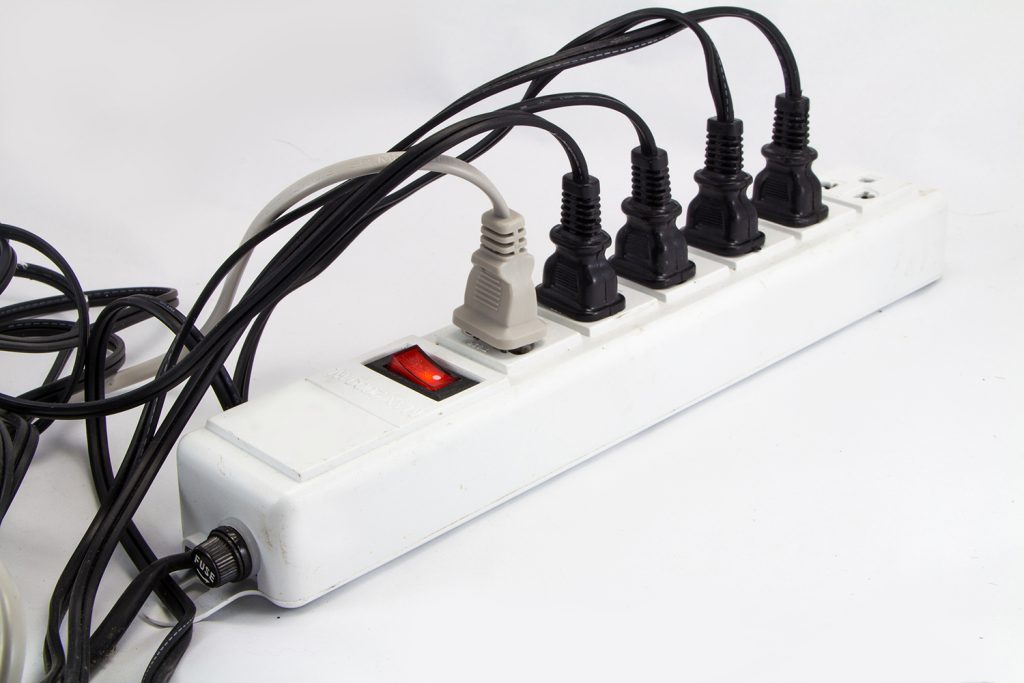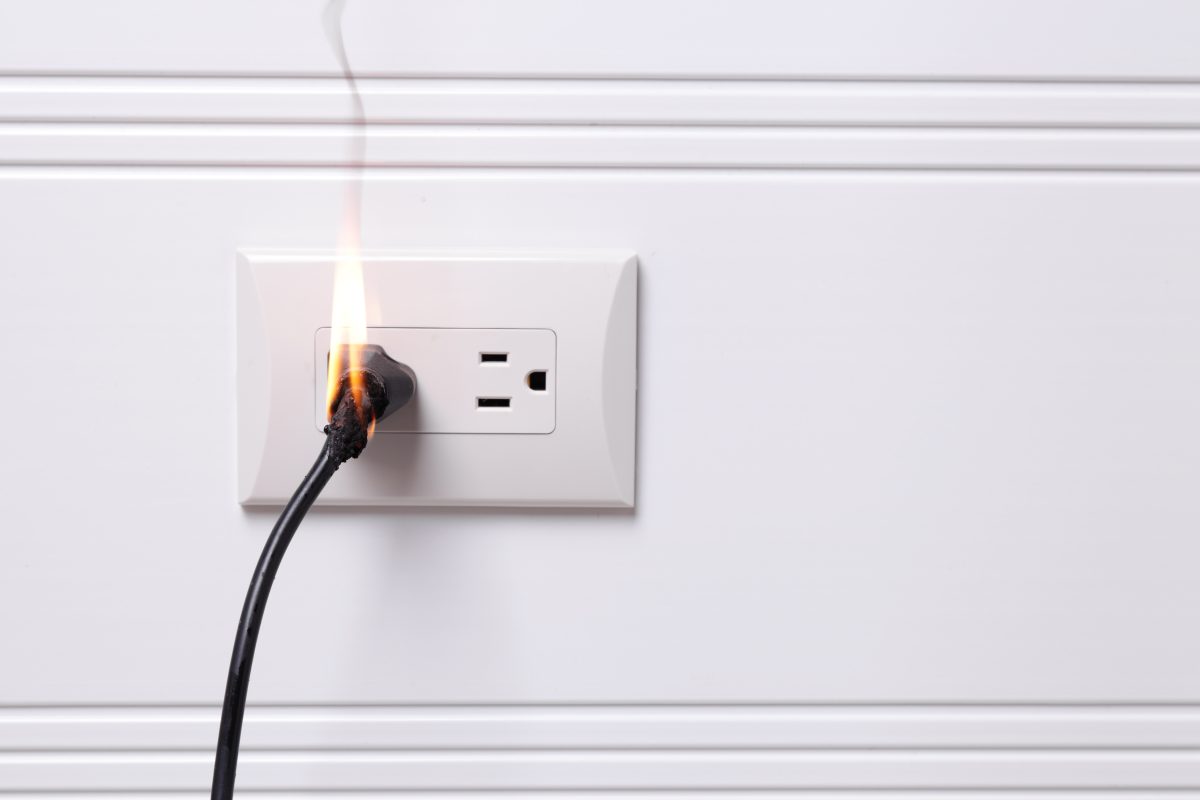The Top Five Causes of Electrical Fires and How to Prevent Them
There are plenty of things you can neglect around the house. Washing the dishes can wait another night. Mowing the lawn can wait a few more hours while you enjoy going for ice cream with your family instead.
But if the outlet in your bathroom sparked when you plugged in your hair dryer this morning, that simply cannot wait. Neglecting anything that has to do with your electrical system can mean an electrical fire!
Many people think an electrical fire will never happen to them, but the truth is it can happen to anyone at any time if you are not engaging in safe electrical practices. Learn more about some common causes of electrical fires and how to prevent them in your home today.
Cause Number One: Overloading a Circuit
There’s more potential for demand on a circuit in your home than ever before, with so much of modern life moving from analog to digital. And while modern electronics and appliances are more efficient than ever, there’s still a chance of fire when a circuit becomes overloaded.
For example, it might be convenient to plug a new appliance into an extension cord or add additional plug options to an existing outlet. However, doing so can be dangerous because you may overload your circuit with too many high amp drawing items.
The breaker trips and closes the entire circuit when a circuit becomes overloaded. If the breaker doesn’t work or doesn’t exist, the insulation around the circuit could melt and start a fire. If you’ve ever smelled smoke randomly in your home or had a breaker trip unexpectedly, you may want a licensed electrician to inspect your system. Don’t put off having your wiring checked; it could mean danger if you overload your circuits!
Electrical fires also happen more frequently in the winter because of the increased electricity usage in homes, which comes from added work for your circuits thanks to things like space heaters, holiday lights, and electric decorations. Instead of adding extension cords or additional plugs to your circuit, have an electrician safely add more outlets to your system. This way is better because your system can handle all the extra appliances and lights in the winter months.
Cause Number Two: Light Fixtures / Improper Bulb Wattage
Lightbulbs have different wattages for a reason! You should never install a bulb that exceeds the maximum wattage on the appliance. A lamp that can only handle up to 100w should never have a bulb with a higher wattage than that. That’s because higher-wattage bulbs strain the wiring inside the appliance and can cause an electrical fire.
Can you install a lower-wattage lightbulb for an appliance?
If, for example, an appliance can handle 100w, can you install an 80w lightbulb? Yes, you can safely install a lightbulb that is lower than the recommended wattage on the device.
Cause Number Three: Bad Outlets
There are two types of outlets that you may have in your home- grounded and ungrounded. Ungrounded outlets are common culprits for electrical fires because they are more likely to spark. However, grounded outlets are not immune to causing issues, as they get worn out over time. The wires in grounded outlets may eventually loosen and can cause electrical problems.
Check your outlets for signs of wear or evidence of ongoing issues. Soot on the outlet, electrical switches, loose wires, or sockets could indicate that your electrical wiring needs work and can warn you that an electrical fire is on the horizon. Never try to perform electrical work yourself! Always contact a licensed electrician if you find evidence that your electrical wiring needs attention.
Cause Number Four: Space Heaters
There are more electrical fires in the colder months because people consume more electricity through appliances like space heaters. Understandably, you want to keep your home toasty during winter’s chill but must ensure you use your space heaters responsibly.
Space heaters are portable and convenient, but you should treat them like the sophisticated, dangerous appliances they are. Space heaters are well-known for causing house fires because they heat up quickly and can cause flammable materials to combust relatively quickly.
Never put your space heater near combustible materials; always turn them off and unplug them when you use them and before sleeping. Ensure you are near your space heaters as they are running, and do not under any circumstances put blankets, bedding, or clothing over the space heater. Never leave them running overnight.
Cause Number Five: Extension Cords

Extension cords are incredibly convenient if you want to plug something in and you don’t have an outlet nearby. Unfortunately, an extension cord can also prove dangerous if you aren’t using it correctly. Plugging too many things into the extension cord can overload the line and cause an electrical fire. Additionally, plugging appliances like air conditioners or washing machines into an extension cord increases fire risk because they are not designed to be used with these large appliances.
When using them, consider extension cords a temporary solution to an electrical need. Extension cords are not permanent solutions for your outlet needs. Instead of adding more extension cords throughout your home and putting additional strain on your circuits, have a licensed electrician come and install new outlets throughout your home to give you safer, more accessible options for plugging in your electronics and appliances.
If you do need to continue using extension cords, you can help prevent extension cord fires by doing a few different things.
- Buy new ones every few years to ensure they are up to date and comply with updated electrical regulations.
- Only plug in the appropriate number of items into the extension cords.
- Ensure you are not using extension cords to power appliances that require a large power draw, like air conditioners.
How Can You Prevent Electrical Fires?
Aside from the tips provided above to help you prevent electrical fires, there are some other general things you can do to keep your home safer from this danger.
- Have your home’s electrical systems inspected to help prevent electrical issues.
- Replace electronics or wires with frayed, broken, or cut wires.
- Never overload a circuit or plug too many things into an outlet. Have an electrician come and install new outlets if you need them.
- Pay attention to warning signs of electrical issues that may cause electrical fires.
Some other preventative measures include installing smoke detectors throughout the home and having a Class C fire extinguisher that can handle electrical fires available in a fire emergency.
What Should I Do in Case of Electrical Fire?
According to fire marshal recommendations, there are a few things you might want to do in case of an electrical fire. If you have an outlet or appliance that catches fire and you’re there to see it happen, cut the power to the thing that’s on fire if you can do so safely.
Remove the plug from the wall or electricity source if possible, and then smother the fire with baking soda or a Class C fire extinguisher. Turning off the circuit breaker is another option if you can’t safely unplug the thing that’s on fire.
Never use water to try to extinguish an electrical fire. Water conducts electricity, and the current can travel back to you, leaving you with the potential for an electrocution or an even worse electrical fire. Always keep the correct fire extinguishers on hand and ensure you are familiar with how to use them in an emergency.
If you cannot put out the fire yourself, you do not want to attempt it yourself, or it is too large to be contained, you need to exit the building immediately. Remember to stay as close to the ground as possible to avoid smoke inhalation as you leave the building. After you’ve left the building, you can call 911 for help.
Call 911 even if you have managed to put the fire out, as other issues may need addressing. Additionally, fires can reignite, especially if you can’t stop the power source or safely remove the plug from the wall. You will also want to call a licensed electrician to come and check your electrical system before restoring power to your home.
Have You Had Your Electrical Systems Inspected Recently?
Homeowners should have their homes inspected every three to five years. If you can’t remember the last time you had your electrical systems checked or want more outlets in your home, get in touch with the professionals at RS Martin for help with all your electrical needs. Contact us today to get started!


 24 Hour
24 Hour